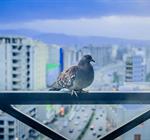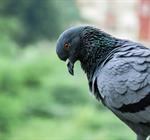
27 Jan 2023 | Apex Environmental Services (UK) Ltd
7 Ways to Keep Birds Out of Your Warehouse
Having to deal with birds in your warehouse is both a pesky and expensive problem. It’s also incredibly common; birds like pigeons and seagulls will often take shelter and nest in a warehouse as these environments offer plenty of shade and cover from intense heat, rain, and other elements.
But a persistent bird problem can wreak havoc on both the integrity of your warehouse and the operations carried out inside; from the expensive task of cleaning up bird droppings to the legitimate health hazards posed by their presence. In this guide, we’re going to offer 7 methods that you can use to deter and discourage birds from settling and taking shelter in your property. Let’s take a look.
Why do birds settle in my warehouse?
Warehouses provide safe havens for birds fleeing the temperamental UK elements; from rain and snow to wind and sunshine. Plus, easy access makes it a convenient roosting choice; birds can sneak in via large open windows or doors, allowing them to take shelter and even nest in your property.
Why removing birds from your warehouse is important
Aside from noise concerns and the general irritation that a bird invasion represents, birds in your warehouse also pose a legitimate health and safety hazard. Bird droppings (also known as bird guano) can be incredibly harmful once dried, and can omit pathogen-laden particles that can provoke serious illness when inhaled. For the wellbeing of your staff, it’s important to act on any bird presence promptly.
In addition to this, removing birds from your warehouse is paramount if the warehouse itself is used to store food items or other perishables; the presence of bird guano can render these items unsafe and therefore unsellable.
Anti bird netting
One of the easiest ways you can prevent birds from nesting on an industrial property is to install comprehensive anti-bird netting. Anti-bird netting involves placing a large net over the roof of the warehouse and any surrounding areas, and the small holes in the netting prevent any birds from being able to access the roof or the interior of the warehouse.
Anti bird netting is safe, cost-effective, and more importantly, won’t cause harm to any birds in the process; don’t forget that UK conservation laws can prohibit the removal of any birds or bird nests on your property, so prevention is one of the easiest ways to evade this common pest problem.
Cruelty-free bird spikes
Another way to protect your warehouse from birds is to install anti-bird spikes. At Apex Bird Control, our anti-bird spikes are manufactured with blunt tips, so they won’t cause any physical harm to birds that still attempt to nestle. This method only works if you’re operating a warehouse with a roof; for open air warehouses, we’d recommend anti-bird netting as an effective and budget-friendly solution.
Hawking and bird scaring
While some property owners can use visual deterrents (such as scarecrows or the display of fake predator birds) to discourage an avian invasion around their home, larger warehouses can double their effects with the use of bio acoustic audio deterrents. Anti-bird audio deterrents can replicate sounds that imitate a bird in distress; this leverages the bird’s own survival instinct and will encourage it to flee and settle elsewhere. Combined with the display of a predator bird (such as a hawk) birds will understand that your warehouse is not a safe place to occupy. This method, coupled with safe and professional nest removal, can ensure a bird-free warehouse.
Post and wire method
If you’re looking for the most discreet solution, a post and wire system can be installed at any height and prevent birds from accessing your property from above. Spring-tensioned wires are attached to posts around the roof of the property, creating a barrier for any flying wildlife without causing any harm to the birds themselves. While this isn’t the best solution for birds that have already nested in your warehouse, it does offer efficient prevention at a low cost.
Mesh for solar panels
If your warehouse has solar panels installed, it’s imperative to take measures to control birds and prevent them from damaging the panels. Bird droppings - also referred to as bird guano - can cause irreversible damage to solar panels, while also rendering the panels themselves ineffective. To cover solar panels, mesh, anti bird netting and a post and wire system can offer effective solutions, and prevent you from spending thousands of pounds a year on guano cleaning services.
Bird traps
While bird traps might sound harmful, ethical traps can be used to deter birds from entering your warehouse; these work by providing a one-way entrance system, where the bird will find itself stuck if it enters the trap. Once the bird is trapped, you can safely open the trap and free the bird outside.
While this isn’t the most cost-effective, long-term, or convenient solution to a warehouse bird invasion, it can help if you’re dealing with birds inside the warehouse itself. The traps can be set with bait, and you can safely and humanely free those that get stuck outdoors.
Light beams
Another way to deter birds from sheltering in your warehouse is to install light beams on the roof; birds typically associate bright lights with danger, so they won’t be tempted to use your warehouse for shelter. While this can represent a large financial investment for the owner of the property, light beams can represent an effective solution when used early in the morning and late at night.
Key takeaways
If you’re dealing with persistent bird invasions in your warehouse, it’s important to take action as soon as possible. Bird guano can pose a serious health and safety risk both to you and your staff if left for long periods of time, and the costs associated with cleaning up bird droppings can make a severe dent in your company’s finances.
With the help of professional bird removal services like Apex Bird Control, you can remove and deter birds both safely and humanely, and in accordance with all UK conservation laws.


